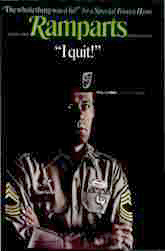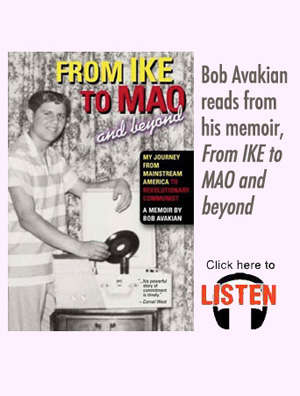Early Connection to Bob Avakian
Remembering Donald W. Duncan:
From Gung-Ho Green Beret to Outspoken Opponent of U.S. Crimes in Vietnam
May 23, 2016 | Revolution Newspaper | revcom.us
The death of Donald W. Duncan, a former Green Beret turned outspoken opponent of the Vietnam War, at 79, was noted on May 6 in a major New York Times obituary, which called him “one of the first returning veterans to portray the war as a moral quagmire” and a “fierce critic of the war” which he called barbaric and illegal. Duncan actually died in 2009, but his death only came to national attention recently.

Donald Duncan's story in Ramparts: "The Whole Thing Was a Lie: I Quit!"
Donald Duncan announced his opposition to the Vietnam War in a February 1966 front cover piece in Ramparts magazine titled “The Whole Thing Was a Lie: I Quit!” (pictured in the New York Times obit). Duncan wrote, “We weren’t preserving freedom in South Vietnam. There was no freedom to preserve. To voice opposition to the government meant jail or death.” He described witnessing torture, murders, and other atrocities carried out by the U.S. military in Vietnam. Duncan’s unequivocal exposure and condemnation of the war in Ramparts had a huge impact and played an important role in fueling the anti-Vietnam War movement. Bob Avakian, then a reporter and staffer at Ramparts, played a key role in developing this piece—a point to which we’ll return.
Duncan would become one of the most important opponents of the war from the ranks of the military. He was a frequent speaker at antiwar rallies and also helped organize key protests, including at the Democratic National Convention in 1968. He was also the military editor at Ramparts, the author of the antiwar memoir The New Legions, and a participant in the International War Crimes Tribunal on Vietnam, organized by philosopher Bertrand Russell and hosted by author and philosopher Jean Paul Sartre.
Donald Duncan and Bob Avakian
The fact that Duncan died in obscurity is itself a condemnation of this system. Duncan should have been celebrated for his contributions. What should also be known, as a critical part of his story, is the role played by Bob Avakian (BA) in helping to make this happen.
The following excerpt from Chapter 7 of BA’s memoir, From Ike to Mao and Beyond: My Journey from Mainstream America to Revolutionary Communist (pp. 144-145), explains his role in Duncan’s coming to grips with his experience in Vietnam and arranging for Duncan to publish his story in Ramparts. At the time, BA had taken a leave from UC Berkeley to be a full-time activist for the antiwar Vietnam Day Committee, including as part of its speakers bureau, and was also working at Ramparts:
One of the important stories we did at Ramparts concerned Donald Duncan. One day some people from the Berkeley anti-war movement came to me and said that they were talking to this guy who was a soldier who was questioning the Vietnam War very seriously and deeply. They wanted me to talk to him because I had done a lot of public speaking and study around the war. So I spent quite a bit of time over at their house talking to this guy, who turned out to be Donald Duncan.
Duncan had been a soldier in Vietnam—he was at the rank of master sergeant when he left Vietnam. He’d come back very disaffected by and very bothered by the war—questioning it and thinking it wasn’t right, but not that clear on a lot of things about it, understandably. I asked him a lot about his experiences in Vietnam and did what I could to help him come to a clearer understanding of the nature of the war and what was wrong with it. And at a certain point, I suggested to both the Ramparts editors and to Donald Duncan himself that they do an article in which he would tell his story and come out and denounce the war. This ended up being a front cover article, with a picture of Duncan in uniform and the headline “I quit!” At that time, there weren’t that many soldiers who’d been in the war itself and come out and publicly denounced it. Ramparts had a circulation of a couple hundred thousands or so, and this article had an impact even beyond the readers of Ramparts.
While I had argued with soldiers that the mere fact that they had been in Vietnam didn’t mean that they were right about the war, there is a truth that if you’ve “paid your dues” fighting there and then you come to say that it’s wrong, that has a big impact on many people—including for the reason that people who are more backward or conservative can’t say, “Oh, that’s just those disgruntled hippies who are cowards, who are draft dodgers, and all that.” As a matter of fact, I would, and did, uphold those people who dodged the draft as doing something truly heroic—not George W. Bush, but people who dodged the draft because they opposed the war, not just to save their own ass. People who evaded the draft, or outright refused to be drafted, or refused to go to Vietnam once they were in the military—people who did these things because they opposed the war—they were doing heroic things, definitely more heroic things than U.S. soldiers who, with all their destructive technology, were massacring and slaughtering the Vietnamese people. Nevertheless, for the U.S. population broadly, for someone who’d been in that war to speak out against it had a very big impact.
Volunteers Needed... for revcom.us and Revolution
If you like this article, subscribe, donate to and sustain Revolution newspaper.








